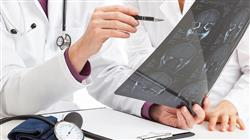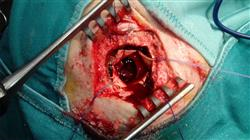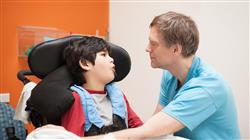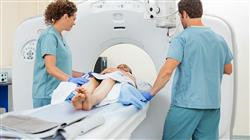University certificate
The world's largest faculty of medicine”
Description
Knowing about advances in neurology will enable physicians to stay abreast of the latest techniques on offer for the diagnosis of potential neurodevelopmental diseases and prescribe more effective treatments"

Neurological Diagnosis has evolved exponentially in recent decades. The introduction of new and sophisticated technologies applied to this field drives and facilitates the development of research. Keeping up with this unstoppable flow of information can be a daunting task, but it is absolutely necessary. In this comprehensive advanced master’s degree, we invite you to the forefront of this specialty where we will bridge the gap between highly specialized fields of Neurology and Neurodevelopment. This is all done thanks to the most complete training on the market, which we have divided into two main blocks of study. On the one hand, Pediatric Neurology and Neurodevelopment, and on the other hand, neurology updates. A way of organizing the information that will make the study of the main novelties in this field much more comprehensible.
It is necessary to understand that general practitioners cannot encompass the complexity of all pediatric subspecialties. As they progress and develop as professionals, each one acquires a specific body of knowledge and chooses their own specialty. In addition, the nuances of child development depending on the age and numerous other factors requires a great deal of specialization on the part of medical professionals working in the field of neurology.
For this very reason, the neurology specialist needs to keep up to date with their area of knowledge, so that they can act efficiently and offer their patients the latest advancements in their clinical practice. However, accessing the latest scientific evidence and keeping up to date with it can be difficult when attempting to balance a professional and personal life, as it requires a level of time and dedication that, on occasions, the specialist does not have.
This advanced master’s degree offers the possibility to deepen and update knowledge of this field, with the use of the latest educational technology. It provides a comprehensive overview of Neurology and Neurodevelopment, while focusing on the most important and innovative aspects of treatments in pediatric neurology. All this in a 100% online training, which will allow you to expand your knowledge and, therefore, your professional skills and competencies in a simple way, adapting your study time to the rest of your daily obligations.
This program has been designed for professionals seeking the highest qualification, with the best didactic material, working on real clinical cases and learning from the best professionals in the sector"
This advanced master’s degree in Neurology and Neurodevelopment contains the most complete and up-to-date program on the market. The most important features include:
- The development of clinical cases presented by experts in Neurology and Neurodevelopment
- The graphic, schematic, and eminently practical contents with which they are created, provide scientific and practical information on the disciplines that are essential for professional practice
- New diagnostic and therapeutic developments in Neurology and Neurodevelopment
- The presentation of hands-on workshops on procedures, diagnostic and therapeutic techniques
- Contains real images in high resolution and practical exercises where the self-evaluation process can be carried out to improve learning
- An algorithm-based interactive learning system for decision-making in the clinical situations presented throughout the course
- Special emphasis on test-based medicine and research methodologies
- Theoretical lessons, questions to the expert, debate forums on controversial topics, and individual reflection assignments
- Content that is accessible from any fixed or portable device with an Internet connection
Our advanced master’s degree is a unique opportunity to study, the most relevant aspects in Neurology and Neurodevelopment, training you further so as to give your career a boost"
Its teaching staff includes health professionals from the medical field, who contribute their work experience to this training, as well as renowned specialists from leading scientific societies.
The multimedia content, developed with the latest educational technology, will provide the professional with situated and contextual learning, i.e., a simulated environment that will provide an immersive training program designed to train for real life situations.
This program is designed around Problem-Based Learning, whereby the Doctor must try to solve different professional practice situations that arise during the program. For this purpose, the professional will be assisted by an innovative interactive video system created by renowned and experienced experts in the field of Neurology and Neurodevelopment with extensive teaching experience.
Increase your decision-making confidence by updating your knowledge through this advanced master’s degree, a program created to train the best"

We offer you the best teaching methodology, with a multitude of practical contents that will allow you to study in a more complete and effective way"
Objectives
This advanced master’s degree in Neurology and Neurodevelopment is oriented towards offering a complete, and detailed up-to-date vision on this subject for physicians working with patients suffering from related disorders. A advanced specialization which offers detailed expertise to professionals.

This advanced master’s degree will allow you to acquire or update your knowledge in Neurology and Neurodevelopment, so that you will be able to offer personalized attention to your patients"
General Objectives
- Update the specialist's knowledge in the different syndromic disorders of this discipline, through evidencebased medicine
- Promote work strategies based on a comprehensive approach and multidisciplinary care in the patient's social environment that become a reference model for achieving excellence in care
- Encourage the acquisition of technical skills and abilities, through a powerful audiovisual system, and the possibility of development through online simulation workshops and/or specific training
- Encourage professional stimulation through continuous education and research.
- Acquire the neurological knowledge and skills necessary for regular clinical practice in specialized consultation
- Know the latest updates and advances in clinical neurology
Specific Objectives
- Perform a correct anamnesis in pediatric neurology
- Explain the procedure for neurological examination of newborns and infants
- Define the correct neuropsychological examination for school children
- Apply neurological assessment scales
- Explain how to perform psychomotor developmental assessment in a thorough and rigorous manner
- Identify warning signs in the evaluation of psychomotor development
- Define the complementary explorations to be applied in prenatal diagnosis
- Explain the usefulness of genetic studies and biochemical studies
- Describe the application of diagnostic imaging in neurodevelopmental assessment and neuropathology
- Explain the use of neurophysiological studies in the diagnosis and evaluation in neuropediatrics
- Describe the execution and evaluation of the electroencephalogram
- Explain the application of visual, truncal and somatosensory evoked potentials in neuropediatrics
- Define the application of the Electroneurogram (ENG) in neuropediatrics
- Explain the causes of neurological involvement when related to congenital viral infections
- Describe congenital bacterial infections that can cause neurological and neurodevelopmental involvement
- Identify congenital parasite infections with neurological repercussions
- Describe the main central nervous system anomalies
- Explain the relationship of perinatal neurological trauma to subsequent neurological impairment
- Define the clinical manifestations of inborn errors of metabolism
- Explain the implication of aminoacidopathies and organic acidemias in neuropediatrics.
- Describe the etiology and risk factors of Cerebral Palsy
- Explain Juvenile Myasthenia Gravis and other neuromuscular junction disorders
- Describe the symptoms, diagnosis and treatment of psychomotor developmental delay and mental retardation
- Define the diagnosis and treatment of learning disorders
- Explain the treatment of mood disorders in the pediatric age range
- Describe the symptomatology and appropriate treatment for children with sleep disorders
- Describe Epilepsy according to the stages of child development
- Explain the diagnosis and appropriate treatment of childhood headaches
- Describe the symptomatology and appropriate treatment for children with bowel and bladder control disorders
- Distinguish the different meningeal syndromes and define how they should be approached and treated
- Classification of the primary tumors of the nervous system
- Explain the treatment of primary tumors of the nervous system
- Define nutritional recommendations in neurological disorders
- Know the hierarchical organization of neuroanatomy and neurophysiology in order to facilitate clinical exploration
- Recognize the rigorousness of classical neurological examination procedures
- Recognize syndromic diagnosis as the basis for understanding neurological diseases
- Recognize the limited role of complementary examinations
- Recognize peripheral nerve, neuromuscular plate, and muscle diseases at a general level
- Diagnostic approach to a patient with neuropathic pain, weakness or fatigability
- Diagnose most of the systemic processes that produce peripheral nerve and muscle alterations
- Know the essential diagnostic techniques and realistically assess what can be expected at this level of care
- Efficiently manage prevention protocols and health programs for vascular risk factors
- Distinguish ischemic strokes of cardioembolic etiology from the rest and to learn efficient prophylactic guidelines for oral anticoagulation
- Recognize symptoms, be clear about what to do and, above all, what not to do
- Know the limitations of each level of care and know how to activate a Stroke Code when necessary
- Efficient and, above all, realistic patient follow-up and control of sequelae and cardiovascular risk factors
- Learn about neurodegenerative processes, which are emerging processes in today's society and which in the near future will acquire epidemic proportions, with enormous associated costs
- Have the clinical skills necessary to properly diagnose and manage Alzheimer's and Parkinson's diseases
- Know how to differentiate alzheimer's disease from other dementias
- Know other hypo- or hyperkinetic movement disorders caused by diseases of the basal ganglia, especially dystonias
- Learn that sleep disorders are multidisciplinary in nature and require a cross-cutting approach
- Learn that insomnia is not treated only with "sleeping pills" and, many times, its use is already a problem in itself
- Learn that snoring is a problem that must be carefully assessed to rule out OSAHS
- Learn that stupor and coma are states in which the brain is highly vulnerable
- Perform the correct neurological assessment of polytraumatized patients
- Recognize the conditions requiring urgent neurosurgery
- Learn to diagnose malformations and fundamental neurodevelopmental disorders
- Acquire training and basic skills in the management of neuro-oncological patients
- Recognize the spatiotemporal symptoms of MS
- Learn how to clinically diagnose MS and its evolutive forms
- Acquire skills in the recognition and treatment of relapses
- Establish Help and Support Guidelines for MS patients
- Learn about other CNS demyelinating and dysimmune processes
- Learn how to diagnose a primary headache
- Recognize the alarm symptoms of a secondary headache
- Protocolize a realistic step-by-step treatment: abortive crisis and migraine prophylaxis
- Inform patients about treatments that are not useful or not rigorously proven by evidence-based medicine (fake news, urban legends, fantasy and scientism)
- Diagnose and treat craniofacial neuralgias
- Recognize what is and what is not Epilepsy
- Distinguish between Idiopathic, Cryptogenic, or Secondary Seizures
- Recognize the most important infectious processes of the CNS and to place them in their context in order to act accordingly
- Review the major neurotoxic agents to prevent nerve injury with appropriate health programs
- Review the main neurological manifestations of systemic diseases
- Know the psychiatric processes associated with neurological diseases
- Differentiate between simulation and conversion syndrome

Make the most of the opportunity and take the step towards getting up-to-date on the latest developments in Neurology and Neurodevelopment"
Advanced Master's Degree in Neurology and Neurodevelopment
.
The area of neurosciences has advanced by leaps and bounds in recent years, which has allowed a significant evolution in the detection of the spectrum of neurological diseases and in diagnostic methods. Because it is essential that the medical specialist has a solid conceptual basis and is kept up to date in the latest protocols of action to address the various neurological and psychiatric pathologies that manifest themselves in their patients, at TECH Global University we developed this Advanced Master's Degree in Neurology and Neurodevelopment, a postgraduate degree designed for the specialization of medical professionals in care services and daily clinical practice in this field.
Specialize in Neurology and Neurodevelopment
.
If one of your goals is to train in the latest updates in scientific research, technology and therapeutic treatments of neurological and psychiatric diseases affecting the population, our Advanced Master's Degree is the one for you. You will review the different symptomatic pictures, signs and characteristics of these conditions in order to develop diagnostic criteria that will allow you to detect their manifestation in time, and you will define the basis for the treatment of the patient according to his or her needs, always seeking his or her well-being and safety. In the largest School of Medicine you will find the necessary tools to enhance your professional growth in this field, as well as a team capable of guiding you and developing your skills to the fullest.







